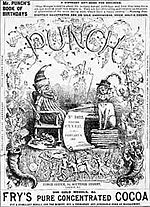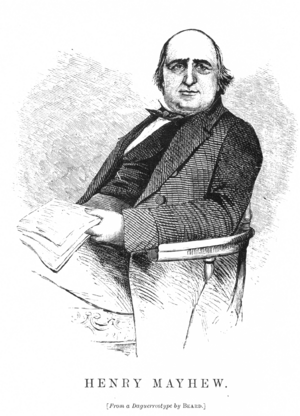Henry Mayhew facts for kids
Henry Mayhew (born November 25, 1812 – died July 25, 1887) was an English writer, journalist, and a strong supporter of social change. He helped start the funny magazine Punch in 1841. He was also an editor for Punch alongside Mark Lemon when it first began.
Mayhew is also famous for his work as a social researcher. He wrote many newspaper articles for the Morning Chronicle. These articles were later put together into a book series called London Labour and the London Poor (1851). This important series looked closely at the lives of poor people in London.
Contents
Biography: Henry Mayhew's Life Story
Early Life: Henry Mayhew's Beginnings
Henry Mayhew was born in London. He was one of 17 children! He went to Westminster School but later ran away to sea. He worked as a midshipman (a junior officer) for the East India Company on a ship going to Calcutta.
He came back in 1829 and started training to be a lawyer in Wales. But he left that to become a freelance journalist. He wrote for a magazine called The Thief. Soon after, he edited a weekly paper called Figaro in London.
Paris and Writing: A New Chapter
In 1835, Mayhew had money problems. He went to Paris with another writer to avoid people he owed money to. In Paris, he spent his time writing. He also met other writers like William Thackeray and Douglas Jerrold.
Mayhew lived in Paris for over 10 years. He returned to England in the 1850s. There, he worked on several writing projects, mostly plays. Two of his plays, But, However and The Wandering Minstrel, were successful.
Punch Magazine: A Satirical Success

On July 17, 1841, Henry Mayhew helped create Punch. When it started, Mayhew and Mark Lemon were the joint editors. They hired many writers and artists to help them. These included Douglas Jerrold, John Leech, and Richard Doyle.
The magazine was first called The London Charivari. This name was a nod to a funny magazine in France called Le Charivari. Mayhew had read this magazine often while in Paris. To show their funny and satirical style, the editors chose the puppet Mr. Punch for their name and logo.
Punch became a surprise hit. In its early years, it sold about 6,000 copies each week. However, the magazine needed to sell 10,000 copies a week to cover all its costs. In December 1842, the magazine was sold to a company called Bradbury and Evans. Mayhew stepped down as joint editor. He stayed on as a "suggestor in chief" while Mark Lemon became the main editor. Mayhew eventually left the magazine completely in February 1845.
Working at Punch allowed Mayhew to meet talented artists. He later hired them to create drawings for London Labour and the London Poor. After Punch, Mayhew started a railway magazine called Iron Times. But this business lost him a lot of money. He had to go to court for bankruptcy in 1846.
Important Work: London Labour and the London Poor
In 1842, Mayhew wrote for the new Illustrated London News. By this time, he was financially stable and had paid off his debts. He married Jane Jerrold, who was the daughter of his friend Douglas Jerrold.
London Labour and the London Poor: Studying Poverty
This important book series looked at the lives of poor people in London. Mayhew wrote in the first volume that he would study the poor in three groups: those who will work, those who can't work, and those who won't work.
He described their clothes, where they lived, their fun activities, and their customs. He also estimated how many people were in each trade and how much money they earned. The books showed how difficult and uncertain many people's lives were. This was happening in what was then the richest city in the world.
Mayhew's detailed descriptions give a clear picture of what London's street markets were like back then. Some street traders in London did not like how Mayhew wrote about them. In 1851, they even started a Street Trader's Protection Association to protect themselves from journalists.
Family Life: Henry Mayhew's Relatives
Henry Mayhew was the grandfather of Audrey Mayhew Allen (born 1870). She was an author who wrote many children's stories for different magazines. She also wrote Gladys in Grammarland, which was like Lewis Carroll's Wonderland books.
Influence: Henry Mayhew's Impact
Mayhew's work was very popular and influenced a group called the Christian Socialists. These included people like Thomas Hughes and Charles Kingsley. Other radical newspapers also printed large parts of his reports.
His detailed investigations gave amazing insights into the lives of the poor in Victorian times. His work, along with earlier studies by Edwin Chadwick, also greatly influenced the writer Charles Dickens.
Mayhew's work inspired the movie The Fool (1990), directed by Christine Edzard. Henry Mayhew has also appeared as a character in TV and radio shows about Victorian London. He was played by Timothy West in the documentary London (2004). David Haig played him in the radio play A Chaos of Wealth and Want (2010). In the 2012 novel Dodger by Terry Pratchett, Mayhew and his wife appear as characters.
Publications and Plays: A Selection
Henry Mayhew is best known for his non-fiction books. But he also wrote many plays, funny short plays (farces), novels, and gave public speeches. Many of his speeches were written down and published.
- 1831 Figaro in London (co-founder and editor, a weekly radical paper)
- 1832 The Thief (a periodical magazine)
- 1834 The Wandering Minstrel: A Farce in One Act (a play first performed on January 16, 1834)
- 1838 But, however: A Farce in One Act (a play by Henry Mayhew and Henry Bayliss)
- 1841-1842 Punch (a satirical magazine, co-founded with Mark Lemon and others)
- 1847 The Greatest Plague of Life: or, the Adventures of a Lady in Search of a Good Servant (a funny novel, co-written with his brother Augustus Mayhew)
- 1849-1850 Survey of Labour and the Poor (a series of 82 letters published in the Morning Chronicle, looking at working people's lives)
- 1851 London Labour and the London Poor, 2 volumes (a book based on his Morning Chronicle articles)
- 1851 The Adventures of Mr. and Mrs. Sandboys and Family, who Came up to London to Enjoy Themselves and See the Great Exhibition (a funny novel)
- 1856 “The Great World of London” (a series of pamphlets)
- 1862 The Criminal Prisons of London: And Scenes of Prison Life
- 1871 London Characters and the Humorous Side of London Life: with upwards of seventy illustrations
See also
 In Spanish: Henry Mayhew para niños
In Spanish: Henry Mayhew para niños


